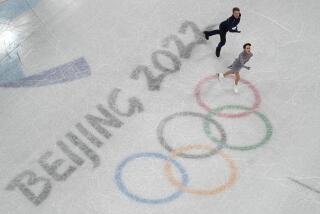Judge Makes No Decision on Harding : Figure skating: He asks for resolution in dispute with USOC. Hearing postponed three days.
- Share via
OREGON CITY, Ore. — A judge urged Tonya Harding and the U.S. Olympic Committee on Friday to resolve their dispute over a disciplinary hearing, saying he is “genuinely concerned” the controversy could disrupt the Winter Games.
The USOC agreed to postpone Harding’s Olympic eligibility hearing from Tuesday until next Friday--only three days before the USOC must submit its final roster for women’s figure skating.
Clackamas County Circuit Judge Patrick Gilroy put off until at least Monday any decision on Harding’s motion to block the USOC hearing from taking place at all.
The ruling came on the eve of the Games’ opening ceremony in Lillehammer, Norway.
The judge said he was concerned about the fairness of forcing Harding to defend herself on such short notice before a hearing that could “take away her Olympic aspirations.”
And he said he was “genuinely concerned what effect this process is going to have on the Olympic Games themselves.”
Harding’s lawyer, Dennis Rawlinson, said he was optimistic the court would prevent the USOC from removing her from the team for her role in the Jan. 6 attack on Nancy Kerrigan.
“Tonya Harding has worked all of her life for the opportunity to represent her country in Lillehammer,” he said. “If we take that opportunity away from her, we can never, never make it up to her.”
The delay means Harding, the national figure skating champion, will remain on the Olympic team for at least the first week of the Winter Games.
“The issues involved in this case are very complex and very difficult and they’re particularly difficult to resolve instantaneously,” Gilroy said.
In Lillehammer, USOC officials were unavailable for comment. Phones calls to the hotel room of Executive Director Harvey Schiller were not answered.
Harding won the U.S. championship in Detroit on Jan. 8, two days after Kerrigan was knocked out of the event when struck on the right knee by a man wielding a club.
Four men were later arrested in the case, including Harding’s ex-husband Jeff Gillooly and her bodyguard. Both have implicated Harding in the assault.
The USOC took up the question of Harding’s eligibility for the Olympic team after the U.S. Figure Skating Assn. issued a report saying there was reason to believe Harding violated skating’s ethics.
Harding said she learned of details of the attack after she returned home on Jan. 10, but did not immediately report them to authorities.
Harding attorney Don Marmaduke argued that the hearing by the USOC’s Games Administrative Board would not give his client enough time to gather witnesses on her behalf.
The problems in the Harding case “are too complex for a quickie rush to judgment,” Marmaduke argued.
Harding’s criminal attorney, Bob Weaver, said it “would take weeks and maybe months” to develop the expert testimony necessary to adequately defend his client.
Some witnesses do not want to cooperate and could not be compelled to do so, he said.
Harding spent part of Friday where she is most at home--on the ice--laughing and holding hands as she skated with a friend.
Asked if she would skate in the Winter Games, Harding replied in a quiet voice: “I hope so.”
Harding filed a lawsuit Wednesday seeking at least $25 million and asking that the USOC proceedings be blocked because, among other things, they fail to provide her with a fair chance to defend herself.
The USOC contends that Congress, in the Amateur Sports Act of 1978, gave it the sole authority to determine who remains on the U.S. Olympic team. The committee said in court documents that it is not subject to the strict due process provisions of the Constitution and must only provide the same general fairness that would be required of any private organization.
In documents supporting its motion to dismiss the lawsuit, the USOC noted that Harding lied to the FBI in an interview Jan. 18, then changed her story after being confronted with the falsehoods.
“The fact that Harding lied to the FBI has raised the issue of whether Harding conducted herself, and continues to conduct herself, in a manner befitting a member of the Olympic team,” the USOC said.
Her attorneys argued, however, that Harding initially lied to the FBI because she feared she would be harmed by Gillooly. Weaver said witnesses could corroborate that, but that attorneys had no power to subpoena them under the USOC procedures.
More to Read
Go beyond the scoreboard
Get the latest on L.A.'s teams in the daily Sports Report newsletter.
You may occasionally receive promotional content from the Los Angeles Times.







